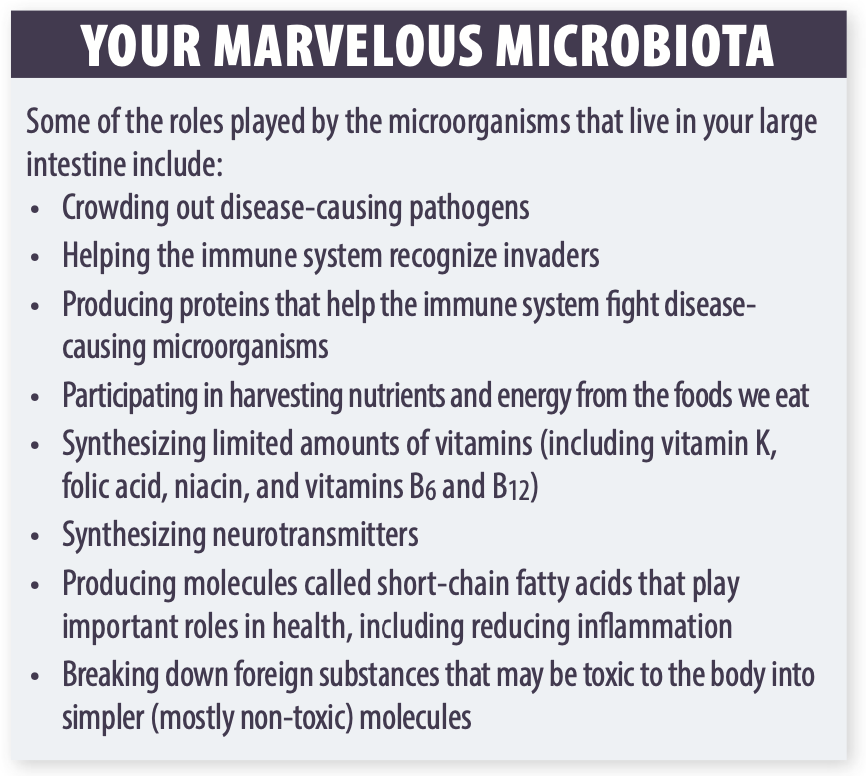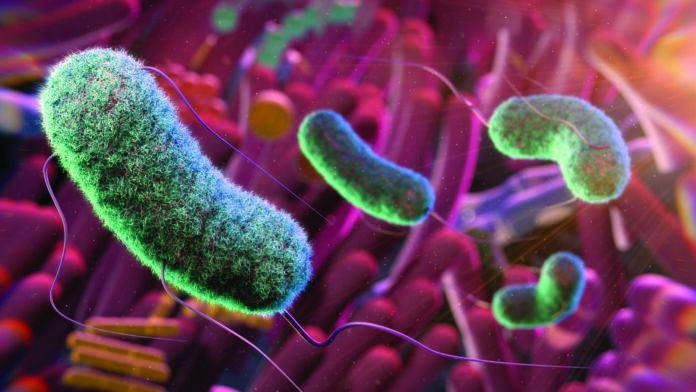You are not alone! Your large intestine is home to a whole community of bacteria and other microorganisms called the microbiota.
Your Microbiota. Everybody’s microbiota is different, and the composition changes over time in response to diet, geography, environment, age, physical activity, medications, and other factors. This complexity and variation make it hard to define a “healthy microbiota,” and it is likely there is no one ideal configuration.
The organisms in our large intestine feed on nutrients from our undigested food, particularly fiber from plant foods. This creates a variety of beneficial hormones, vitamins, and other metabolites that are absorbed into your blood. These compounds are one of the main ways in which the microbiota influences our overall health. (For more on the many roles the microbiome plays, see “Your Marvelous Microbiota.”)
The Microbiota and Health. Imbalances in the makeup of the gut microbiota are believed to play a role in cardiovascular disease, type 2 diabetes, cancer, inflammatory bowel disease, liver disease, and chronic kidney disease.
Research in humans suggests a more diverse gut microbiota is associated with better health. In a controlled feeding study that involved Tufts researchers, participants with more types of microorganisms in their gut were less likely to have high body mass index (BMI), fatty liver, or high levels of fat around and between organs (visceral fat), and more likely to have higher HDL (good) cholesterol levels.
Shaping Your Microbiota. Dietary intake helps shape the makeup of your gut microbiota. A healthy dietary pattern has been associated with higher levels of specific species of bacteria, and people with more of these species were likely to have lower blood pressure and better blood sugar control. A less healthy dietary pattern has been associated with higher levels of other bacteria species, which were associated with markers of poor cardiometabolic health. In other words: healthy dietary choices may go hand-in-hand with a healthy population of gut microbes.

Since most good bacteria living in our gut feed on fiber, consuming fiber-rich unprocessed or minimally processed plants—fruits, vegetables, nuts/seeds, beans, lentils, and whole grains—is important to the health of your gut microbiota. Fiber is a prebiotic—something that promotes the growth of beneficial microorganisms in the gut.
➧ Eat Fiber. Choose naturally fiber-rich foods like fruits, vegetables, whole grains, legumes, nuts, and seeds in place of refined grains and other highly processed options.
➧ Feed on Fermented. Fermented foods like yogurt, kefir, miso, tempeh, and kambucha tea contain live microorganisms and nutrients that may support a healthy microbe population in your gut. Watch for high levels of salt in fermented foods like sauerkraut, kimchi, and other pickled vegetables and the potential for high sugar content in yogurt and kefir.
Probiotics—live microorganisms that can be consumed in foods or supplements—may help establish or support a healthy microbiota population. We still have a lot to learn about using probiotics in clinical treatment of disease, but there is a lot of research going on in this area. Fermented foods have probiotic potential. They contain live microorganisms and nutrients that may support a healthy gut microbiome, but this possibility has not been well studied to date. In a small randomized controlled trial, a 10-week diet rich in fermented foods like yogurt, kefir, miso, tempeh, kambucha tea, and kimchi (Korean fermented cabbage) and other fermented vegetables enhanced the diversity of the gut microbiota and decreased inflammatory markers. (Just watch out for added salt and sugars when choosing fermented foods!)
Whole and minimally processed fruits, vegetables, legumes, nuts/seeds, whole grains, and yogurt are healthy choices because they nourish you and the beneficial microbes that live in your gut. Feed yourself, and your microbe friends, well!





















